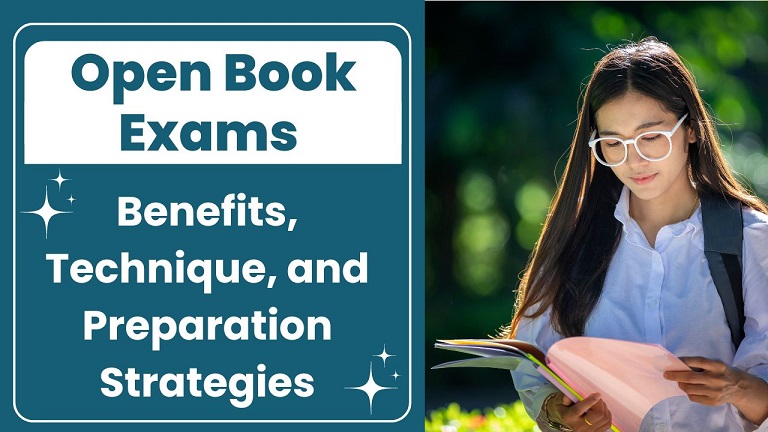Open Book Exams Benefits, Technique, and Preparation Strategies
Open Book Exams – OBEs, a departure from traditional closed book exams (CBEs), offer students the liberty to consult their textbooks, notes, and other study materials during the assessment.
This article sheds light on the multifaceted aspects of OBEs, including their benefits, drawbacks, and the strategic nuances of preparing for them.
The essence of examinations lies in gauging students’ academic understanding. However, the conventional closed-book format often amplifies the pressure and anxiety associated with performance. Educational institutions increasingly turn to open-book assessments to alleviate this stress.
Unlike CBEs emphasizing memorization, OBEs prioritize evaluating a student’s ability to locate relevant information, comprehend it effectively, and apply it aptly to solve problems or respond to queries.
In comparing OBEs and CBEs, it becomes evident that they entail distinctive impacts on students’ educational journey and readiness.
While CBEs demand extensive memorization and rehearsal, OBEs prioritize the application of knowledge acquired.
Interestingly, there’s a common misconception that OBEs, by granting access to references, inherently lead to better performance.
However, the reality is nuanced. OBEs challenge students to sift through many materials within a limited timeframe, necessitating a robust understanding of the subject matter.
Preparing for OBEs requires a strategic shift. Unlike the intensive memorization often associated with CBEs, excelling in OBEs demands a deeper comprehension of the material.
Students must engage in meticulous reading of lecture notes and course materials and active participation in activities geared towards enhancing their test-taking skills.
It’s essential to recognize that both OBEs and CBEs serve as effective tools for evaluating students’ knowledge retention and application.
While OBEs assess the practical application of acquired knowledge, CBEs foster critical thinking and deeper engagement with the subject matter.
To thrive in OBEs, students must adopt a comprehensive approach to preparation. This entails cultivating a thorough understanding of the subject matter, honing effective study strategies, and mastering the art of navigating resources efficiently during the examination.
In essence, navigating the terrain of open-book examinations necessitates a blend of strategic preparation, critical thinking, and adept utilization of available resources.
By embracing these principles, students can position themselves for success in the evolving landscape of academic assessment.
Effective Note Organization
Both Open Book Exams (OBEs) and Closed Book Exams (CBEs) assist candidates in retaining and applying information in diverse ways. While OBEs gauge the application of acquired knowledge, CBEs prompt deeper contemplation of studied material.
Preparing for different exam formats demands varied approaches. CBEs lean heavily on rote memorization, whereas OBEs necessitate a more nuanced understanding. Let’s explore strategies for excelling in OBEs.
Balancing OBEs and CBEs
Students increasingly favor OBEs for their perceived stress reduction and emphasis on critical thinking over mere memorization. Successful implementation of OBEs hinges on tailored curriculum adjustments at each educational stage, ensuring their efficacy in fostering application-based knowledge.
It’s paramount to leverage OBEs to enhance practical understanding while recognizing the enduring value of CBEs in ingraining core concepts.
Time Management Challenges
The time spent referencing materials during OBEs can detract from addressing exam questions efficiently. Students may need help to discern relevant information amidst a sea of resources, impacting their ability to complete the exam within the allotted timeframe.
Over-reliance on Study Resources
Refraining from relying excessively on reference materials during OBEs can hinder comprehensive understanding. Instead of engaging deeply with the subject, students may resort to surface-level memorization, undermining the exam’s intended purpose.
Simulating Real-World Scenarios
OBEs mirror professional contexts where access to references is commonplace. By permitting resource utilization, these exams evaluate students’ capacity to leverage available tools to tackle challenges, transcending mere memorization.
Fostering Critical Thinking
OBEs propel examinees beyond rote memorization, fostering critical thinking and practical application of concepts. Students must comprehend, analyze, and apply knowledge to real-world scenarios, cultivating higher-order cognitive skills.
FAQ:
What are the benefits of open-book exams?
Open-book exams facilitate constructive learning by leveraging multiple resources, reducing stress levels while promoting proficiency.
What strategies are effective for exam preparation?
Research advocates for short study blocks interspersed with regular breaks to optimize learning effectiveness.
What skills are essential for open-book exams?
Open-book exams emphasize synthesis, analysis, and application, underscoring the importance of higher-order thinking and writing skills.
Thanks for visiting Physics Wala
- Toppers Preparation Strategies For BPSC Exam
- Exploring Educational Options Beyond Repeating JEE Main
- IELTS Eligibility Criteria: Unlock Your Global Opportunities
- IELTS General Training Preparation Strategy and Test Format
- IELTS Academic Training Preparation Strategies

